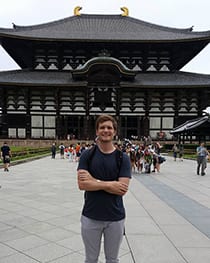The Tower Center sat down with Tower Scholar Matthew Reitz, class of 2017, to discuss his research on U.S.-Japan security, and more recently, free trade. Reitz, a political science and international studies major, spent June studying in Japan with Professor Hiroki Takeuchi. He is now pursuing a research project with Hunt Mexico examining the effects of free trade agreements on labor wages.
 Why did you choose Asia as you area of focus for the international studies major?
Why did you choose Asia as you area of focus for the international studies major?
We’re living in the Asia Century. Asian states have rapidly developed their economies in the past 70 years, and now they’re beginning to play an increasingly important role in international relations and global governance. These states are contributing to peacekeeping and economic development but they’re also competing for resources and prestige, and they are modernizing their militaries. The United States has a lot of opportunity in the Asia-Pacific to demonstrate its leadership, foster cooperation to avoid conflict, and enable economic growth for all parties, but we need to play an active role in the region. We need people who understand Asia’s history, its cultures and its peoples.
What stood out to you about the culture in Japan?
I was in a hurry to get to the campus library one morning and forgot to turn off the fan in
my room. When I came home later that day, my host mom told me people in Japan are conscious of wasting energy and reminded me to be more careful in the future to avoid leaving electronics on. This is just one example of the environmental awareness I saw while in Japan. In America, many of us leave our lights on at night, throw our recycling into trash cans or leave the thermostat at 68 degrees Fahrenheit. It’s different in Japan. They take efforts to minimize their environmental impact and its part of their daily life.
What do you consider to be the most pressing security issue for the U.S.-Japan relationship?
The most pressing concern for the U.S.-Japan security relationship is managing the rise of China. China could be a responsible international player or an aggressive one that attempts to rewrite the rules in its own favor. The United States, being the dominant power and protector in the Pacific, and Japan, being a major regional power, naturally need to work together to engage China diplomatically to ensure peace.
Your research for Hunt-Mexico switches focus from security to free-trade. What impact do you expect to find free trade agreements have on labor wages?
Changing from security issues in the Pacific to examining the impact of trade at home lets me research a global issue that has significant ramifications locally. In this election cycle we see a lot of hot air about “free trade” versus “fair trade.” Many Americans feel left behind by agreements like NAFTA and are worried that agreements like the Trans-Pacific Partnership could have the same effect. Examining the impacts of trade on a specific sector like energy will help create a greater understanding of trade for policy-makers and activists alike.
I suspect to find that NAFTA positively impacted energy-sector wages for skilled workers since it significantly reduced barriers to trade and increased investment in capital and infrastructure. The energy sector was one of NAFTA’s big economic winners but there’s still the question of how unskilled workers were impacted. I suspect NAFTA had adverse effects on unskilled workers since there’s greater access to cheap labor. This likely would have depressed wages as major energy companies could look across the border if local wages are too high.
How has the Tower Scholar program shaped your goals and aspirations for the future?
Even before becoming a Tower Scholar, I always had this hunch I’d end up doing something in the international relations field. The Tower Scholar Program, from the Iran Nuclear Deal case project last year to my free trade research this year, builds a solid foundation for me to do so. I hope to enter the State Department’s Foreign Service one day and serve the United States. as a diplomat. The Tower Scholar Program has taught me how to think critically and strategically, work on a team with diverse view points, and undertake independent research, all of which will prove invaluable in my future endeavors.